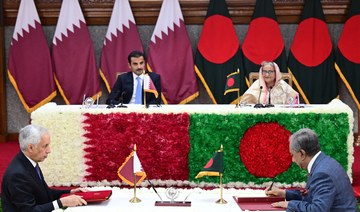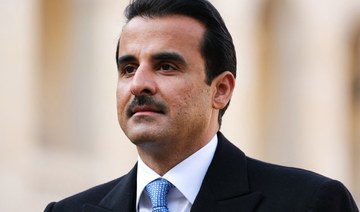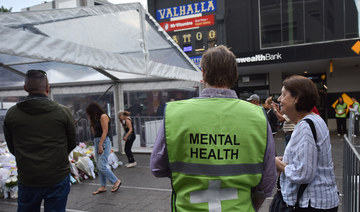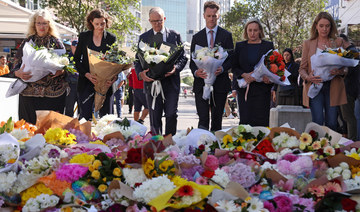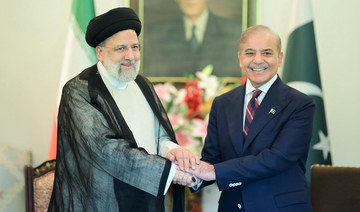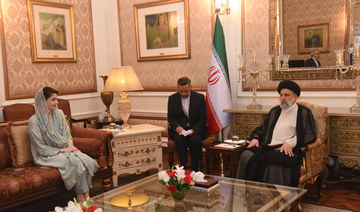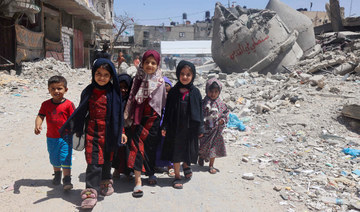WASHINGTON: Special Counsel Robert Mueller’s report on his inquiry into Russia’s role in the 2016 US election described in extensive and sometimes unflattering detail how President Donald Trump tried to impede the probe, raising questions about whether he committed the crime of obstruction of justice.
The release of the 448-page report on Thursday after a 22-month investigation marked a milestone in Trump’s tumultuous presidency and inflamed partisan passions ahead of his 2020 re-election bid.
Democrats said the report contained disturbing evidence of wrongdoing by Trump that could fuel congressional investigations, but there was no immediate indication they would try to remove him from office through impeachment.
Mueller built an extensive case indicating the Republican president had committed obstruction of justice but stopped short of concluding he had committed a crime, though he did not exonerate the president. Mueller noted that Congress has the power to address whether Trump violated the law.
“The conclusion that Congress may apply the obstruction laws to the President’s corrupt exercise of the powers of office accords with our constitutional system of checks and balances and the principle that no person is above the law,” the report stated.
Mueller also unearthed “numerous links” between the Russian government and Trump’s campaign and said the president’s team “expected it would benefit electorally from information stolen and released through Russian efforts,” referring to hacked Democratic emails.
But Mueller, a former FBI director, concluded there was not enough evidence to establish that Trump’s campaign engaged in a criminal conspiracy with Moscow.
Trump appeared to be in a celebratory mood, saying at a White House event with wounded US troops he was “having a good day” following the report’s release, adding, “It’s called no collusion, no obstruction.” Trump, whose legal team called the report “a total victory,” has long described Mueller’s inquiry as a “witch hunt.”
Trump headed to his resort in Florida for the weekend, and on landing on Thursday night told a crowd of well wishers at the airport: “Game over folks, now it’s back to work.”
The report, with some portions blacked out to protect sensitive information, provided fresh details of how Trump tried to force Mueller’s ouster, directed members of his administration to publicly vouch for his innocence and dangled a pardon to a former aide to try to prevent him from cooperating with the special counsel.
“The President’s efforts to influence the investigation were mostly unsuccessful, but that is largely because the persons who surrounded the President declined to carry out orders or accede to his requests,” the report stated.
The report said that when former Attorney General Jeff Sessions told Trump in May 2017 that the Justice Department was appointing a special counsel to look into allegations that his campaign colluded with Russia, Trump slumped back in his chair and said, “Oh my God. This is terrible. This is the end of my presidency. I’m f***ed.”
Attorney General William Barr told a news conference Mueller had detailed “10 episodes involving the president and discusses potential legal theories for connecting these actions to elements of an obstruction offense.” Barr concluded last month after receiving a confidential copy of Mueller’s report that Trump had not actually committed a crime.
Trump was wary of FBI scrutiny of his campaign and him personally, the report said. “The evidence does indicate that a thorough FBI investigation would uncover facts about the campaign and the president personally that the president could have understood to be crimes or that would give rise to personal and political concerns,” the report stated.
Any impeachment effort would start in the Democratic-led House of Representatives, but Trump’s removal would require the support of the Republican-led Senate — an unlikely outcome. Many Democrats steered clear of impeachment talk on Thursday, although a prominent liberal congresswoman, Alexandria Ocasio-Cortez, embraced the idea.
“Many know I take no pleasure in discussions of impeachment. I didn’t campaign on it, & rarely discuss it unprompted,” she said on Twitter. “But the report squarely puts this on our doorstep.”
The House, when it voted to impeach President Bill Clinton in 1998, included obstruction of justice as one of the charges. The Senate ultimately decided not to remove Clinton from office.
The Democratic chairman of the House Judiciary Committee, Jerrold Nadler, said he would issue subpoenas to obtain the unredacted Mueller report and asked Mueller to testify before the panel by May 23.
Nadler told reporters in New York Mueller probably wrote the report with the intent of providing Congress a road map for future action, but the congressman said it was too early to talk about impeachment.
“Mueller’s report paints a damning portrait of lies that appear to have materially impaired the investigation, a body of evidence of improper contacts with a foreign adversary, and serious allegations about how President Trump sought to obstruct a legitimate, and deeply important, counterintelligence investigation,” the Democratic chairs of six House committees said in a statement.
Election meddling
The inquiry laid bare what the special counsel and US intelligence agencies have described as a Russian campaign of hacking and propaganda to sow discord in the United States, denigrate 2016 Democratic candidate Hillary Clinton and boost Trump, the Kremlin’s preferred candidate. Russia has denied election interference.
In analyzing whether Trump obstructed justice, Mueller looked at a series of actions by Trump, including his attempts to remove Mueller and limit the scope of his probe and efforts to prevent the public from knowing about a June 2016 meeting at Trump Tower in New York between senior campaign officials and Russians.
In June 2017, Trump directed White House counsel Don McGahn to tell the Justice Department’s No. 2 official, Rod Rosenstein, that Mueller had conflicts of interest and must be removed, the report said. McGahn did not carry out the order. McGahn was home on a Saturday that month when Trump called him at least twice.
“You gotta do this. You gotta call Rod,” McGahn recalled the president as saying, according to the report.
House Judiciary Democrat Jamie Raskin pointed to Trump’s effort to get McGahn to fire Mueller and then lie about being told to do so as an area of interest for lawmakers, and said McGahn and former Attorney General Jeff Sessions could be valuable witnesses as the committee moves forward.
“There are these dramatic episodes of presidential attempts to interfere with the Mueller investigation, and I think people would like to hear from a number of officials involved. White House counsel McGahn jumps out as an important witness,” he told Reuters.
It also said there was “substantial evidence” Trump fired James Comey as FBI director in May 2017 due to his “unwillingness to publicly state that the president was not personally under investigation.” The FBI headed the inquiry at the time.
Mueller cited “some evidence” suggesting Trump knew about former national security adviser Michael Flynn’s controversial calls with the Russian ambassador to the United States before Trump took office, but evidence was “inconclusive” and could not be used to establish intent to obstruct.
The report said Trump directed former campaign manager Corey Lewandowski to ask Sessions to say the Russia investigation was “very unfair.”
Barr, a Trump appointee, seemed to offer cover for Trump’s actions by saying the report acknowledges “there is substantial evidence to show that the president was frustrated and angered by a sincere belief that the investigation was undermining his presidency, propelled by his political opponents, and fueled by illegal leaks.”
“President Trump faced an unprecedented situation. As he entered into office and sought to perform his responsibilities as president, federal agents and prosecutors were scrutinizing his conduct before and after taking office and the conduct of some of his associates,” Barr said.
Mueller’s team did not issue a subpoena to force Trump to give an interview to the special counsel because it would have created a “substantial delay” at a late stage in the investigation, the report said. Trump refused an interview and eventually provided only written answers.
The report said Mueller accepted the longstanding Justice Department view that a sitting president cannot be indicted on criminal charges, while still recognizing that a president can be criminally investigated.
The report listed 14 criminal referrals for investigation by US prosecutors but 12 of those were fully blacked out because they are open investigations.
Mueller said evidence he collected indicates Trump intended to encourage his former campaign chairman, Paul Manafort, not to cooperate and that the evidence supports the idea that Trump wanted Manafort to believe he could receive a presidential pardon.
The report said the special counsel’s team determined there was a “reasonable argument” that the president’s son, Donald Trump Jr., violated campaign finance laws, but did not believe they could obtain a conviction.
The report cited Trump’s repeated efforts to convince Sessions to resume oversight of the probe after he had recused himself because of his own prior contacts with Russia’s ambassador to the United States.
In unflattering detail, Mueller report reveals Trump actions to impede inquiry
In unflattering detail, Mueller report reveals Trump actions to impede inquiry

Four injured as escaped army horses bolt through central London
Photos and video posted on social media by British news outlets showed two horses running along busy roads, dodging buses, taxis and other traffic.
Both were wearing saddles and bridles, with one apparently covered in blood on its chest and forelegs.
A number of prestigious army cavalry regiments have stables in the British capital and horses are a regular sight around government buildings on Whitehall, Buckingham Palace, The Mall and in nearby Hyde Park.
London Ambulance Service said it was called at 8:25 am (0725 GMT) to reports of a person being thrown from a horse on Buckingham Palace Road.
No details were released on the injured people or the exact circumstances of their injuries.
The driver of a Mercedes car told LBC radio he had been waiting outside a hotel in Buckingham Palace Road when he felt something smash into his car.
He said he saw three or four horses near the vehicle, and that an army rider had been thrown off and injured.
One horse also reportedly crashed into a parked double-decker tour bus, smashing the windscreen.
One commuter shared a video on social media platform X, formerly Twitter, showing a black horse and a white horse being pursued by a black car.
“It was the street from Tower Bridge toward Limehouse Tunnel... just running past cars and an unmarked Range Rover following them,” the person said.
Up to seven horses initially got loose, Britain’s domestic Press Association news agency reported, with police working with the army to recapture them.
The army said in a statement that “a number of military working horses became loose during routine exercise this morning.”
“All of the horses have now been recovered and returned to camp. A number of personnel and horses have been injured and are receiving the appropriate medical attention,” it added.
Two of the horses were recaptured by the City of London Police, which polices the Square Mile financial district.
It said officers had contained two animals and that “an army horse box had collected the horses and transported them to veterinary care.”
Nepal’s president asks visiting Qatari emir to help free student held hostage by Hamas

- Al-Thani said he would do everything possible to help release Bipin Joshi
- Joshi was among 17 Nepali students studying agriculture in Alumim kibbutz
Katmandu, Nepal: Nepal’s president asked the emir of Qatar, who is on a two-day visit to the South Asian country, to help release a Nepali student held hostage by Palestinian militant group Hamas, officials said on Wednesday.
President Ram Chandra Poudel met with Sheik Tamim bin Hamad Al-Thani at the president’s house in the capital, Katmandu.
Al-Thani said he would do everything possible to help release Bipin Joshi, the Nepali president’s press adviser, Kiran Pokharel, told The Associated Press.
Joshi was among 17 Nepali students studying agriculture in Alumim kibbutz, near the Gaza Strip, when Hamas attacked Southern Israel on Oct.7. Ten of the students were killed, six injured while Joshi was abducted and taken to Gaza.
Though there has been no information on his condition or whereabouts, Nepali officials said they believed he was still alive.
Hamas’ sudden attack on Israel in October killed 1,200 people and some 250 others hostage were taken hostage. This has sparked a war that has so far killed more than 34,000 Palestinians in Gaza, at least two-thirds of them women and children, according to the local health ministry.
Qatar has played a key intermediary role throughout the war in Gaza. Along with the US and Egypt, the Gulf State was instrumental in helping negotiate a brief halt to the fighting in November that led to the release of dozens of hostages.
Pokharel also said the emir discussed the conditions of an estimated 400,000 Nepali migrant workers residing in Qatar, who mostly work in construction and manual labor. Concerns about working in extreme heat — that could reach over 40 C (104 F) — inadequate living facilities and abuse have risen in recent years.
Human Rights Watch released a statement on Sunday, asking that labor protection for migrant workers be prioritized during the emir’s visit.
The emir said there were programs planned to help Nepali workers find employment in other sectors, Pokharel said.
Al Thani also said his country planned to cooperate with Nepal on building hydropower plants, food production, and in the agriculture and tourism sectors.
The emir’s stop in Katamdnu is his last after visiting Bangladesh and the Philippines. He flies home later on Wednesday.
Australian counter terrorism force arrests seven teenagers after Sydney bishop stabbing
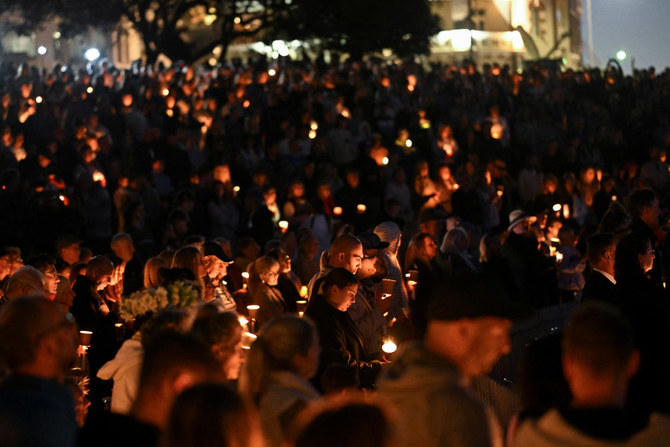
- A team of more than 400 police and security personnel were involved in the operation
- Police said they took the teens into custody because they posed an “unacceptable risk” to society
SYDNEY: An Australian counter terrorism team arrested seven teenagers on Wednesday linked to a boy charged with a religiously-motivated terror attack on a Sydney bishop and questioned another five people.
Police said a team of more than 400 police and security personnel were involved in the operation, which arrested associates of a 16-year-old boy charged with a terrorism offense for the knifing of Assyrian Bishop Mar Mari Emmanuel during a live-streamed church service on April 15.
Police said they took the teens into custody because they posed an “unacceptable risk” to society. They will allege the teens believed in a religiously motivated violent extremist ideology. A further five people are being questioned by police.
“I can assure the community there is no ongoing threat to the community, and the action we have taken today has mitigated any risk of future or further harm,” said New South Wales state Police Deputy Commissioner David Hudson at a news conference following the arrests.
Police said in a statement that the operation was ongoing.
Coming only days after a deadly mass stabbing in Bondi, the attack on Emmanuel and fears of further attacks or reprisals against the city’s Muslim community have put the normally peaceful Sydney on edge. Gun and knife crime is rare in the city, one of the world’s safest.
The Joint Counter Terrorism Team (JTT) operation, which involved 13 raids in Sydney and the regional town of Goulburn, was a combined effort between state and federal police as well as the domestic intelligence agency.
A significant amount of electronic material was seized in the raids, police said in a statement.
Australia’s top domestic spy chief on Tuesday asked technology companies to give it access to user messages in limited circumstances so it could fight extremists.
Iran president arrives in Sri Lanka as minister sought for arrest
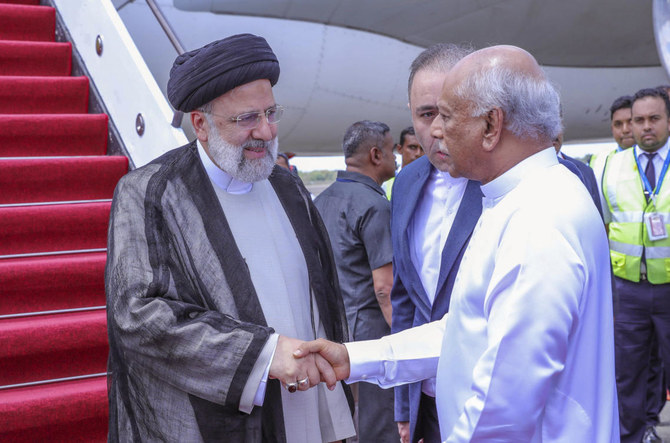
- Raisi traveled to the island nation after concluding a state visit to Pakistan
- Raisi arrived in Sri Lanka to inaugurate $514 million Uma Oya irrigation and hydro-electricity project
COLOMBO: Iranian President Ebrahim Raisi arrived in Sri Lanka on Wednesday to inaugurate a power and irrigation project, unaccompanied by his interior minister who is being sought for arrest over a deadly 1994 bombing.
Raisi traveled to the island nation after concluding a state visit to Pakistan alongside Ahmad Vahidi, accused by Argentina of orchestrating the 1994 attack on a Jewish community center in Buenos Aires that killed 85 people.
Interpol issued a red notice requesting police agencies worldwide to take Vahidi into custody, and Argentina had asked both Pakistan and Sri Lanka to arrest him.
But the minister was not seen accompanying Raisi, who had arrived in Sri Lanka to inaugurate an Iran-backed power and irrigation project.
Iran’s official news agency IRNA reported that Vahidi was back in Iran on Tuesday, where he attended a ceremony to induct a new provincial governor.
An official from Sri Lanka’s foreign ministry told AFP that the interior minister was not listed as part of the Iranian delegation.
The 1994 assault has never been claimed or solved, but Argentina and Israel have long suspected the Iran-backed group Hezbollah carried it out at Iran’s request.
Prosecutors have charged top Iranian officials with ordering the attack, though Tehran has denied any involvement.
The court also implicated Hezbollah and called the attack against the AMIA — the deadliest in Argentina’s history — a “crime against humanity.”
Delayed project
Raisi arrived at an airport in southern Sri Lanka on Wednesday morning to inaugurate the Iran-backed $514 million Uma Oya irrigation and hydro-electricity project.
It was due to be commissioned in March 2014 but sanctions against the Islamic Republic saw the project mired in a decade of delays, Sri Lanka has said.
Sri Lanka funded most of the $514 million project after an initial investment of $50 million from the Export Development Bank of Iran in 2010, while construction was carried out by Iranian firm Farab.
Sri Lanka President Ranil Wickremesinghe’s office said Raisi’s visit symbolized “the cooperation between the two nations in this significant infrastructure endeavour.”
The two reservoirs are slated to irrigate 4,500 hectares (11,100 acres) of new land, while the hydro dam generators have a capacity of 120 megawatts.
Iran is a key buyer of Sri Lanka’s tea, the island’s main export commodity.
Sri Lanka is currently repaying a legacy debt of $215 million for Iranian oil by exporting tea. The country’s only oil refinery was built by Iran in 1969.
Raisi arrived in Sri Lanka after a three-day visit to Pakistan that followed tit-for-tat missile strikes in January in the region of Balochistan, which straddles the two nations’ porous border.
Tehran carried out the first strikes against an anti-Iran group inside Pakistan, with Islamabad retaliating by hitting “militant targets” inside Iran.
Both nations have previously accused each other of harboring militants on their respective sides of the border.
Ending Mideast conflict not a priority for most Americans: Survey
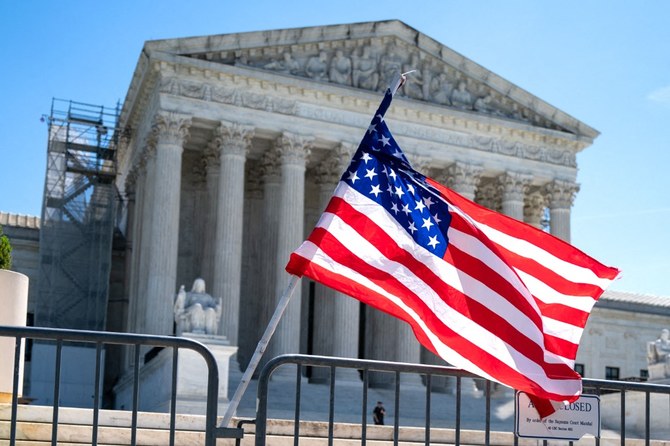
- 83% of respondents say Biden should focus on domestic policy
- 31% say supporting Israel should be given no priority
Chicago: A majority of Americans do not see the Israeli-Palestinian conflict as a foreign policy priority, according to two new concurrent surveys by the Pew Research Center.
Americans identified as their top four of 22 foreign policy priorities protecting the country from terrorism (71 percent), reducing illegal drugs (64 percent), preventing the spread of weapons of mass destruction (63 percent) and maintaining a military advantage over foreign powers.
Finding a solution to the Israeli-Palestinian conflict drew 29 percent, ranking only 14th among the 22 priorities.
The question of “supporting Israel” ranked even lower at 20th with 22 percent, with 31 percent opposing that support.
“Overall, a majority of Americans say that all 22 long-range foreign policy goals we asked about should be given at least some priority. Still, about three in 10 say supporting Israel, promoting democracy in other nations (28 percent) and supporting Ukraine (27 percent) should be given no priority,” Jacob Poushter, Pew associate director of research, told Arab News.
“Even with these priorities, 83 percent of Americans say it is more important for President Joe Biden to focus on domestic policy, compared with 14 percent who say he should focus on foreign policy.
“In 2019, 74 percent wanted then-President Donald Trump to focus on domestic policy, and 23 percent said he should focus on foreign policy.”
Pew researchers said finding a solution to the Israeli-Palestinian conflict was previously “a priority that saw no partisan difference at all” in a 2018 survey.
But the new surveys show a “partisan gap” emerging, with twice as many Democrats (36 percent) today than in 2018 calling the conflict “a priority,” while the share of Republicans (20 percent) has remained constant.
Twenty-nine percent of Americans say they have a great deal or fair amount of confidence in the UN’s ability to provide effective humanitarian aid to Gaza. Fifty-one percent do not have confidence and 19 percent are unsure.
Only 15 percent of Americans say they have confidence in the UN’s ability to enforce a ceasefire between Israel and Hamas. Sixty-seven percent have no confidence and 17 percent are unsure.
A recent Pew survey found that only 12 percent of Americans believe that lasting peace between Israelis and Palestinians is at least somewhat likely.



